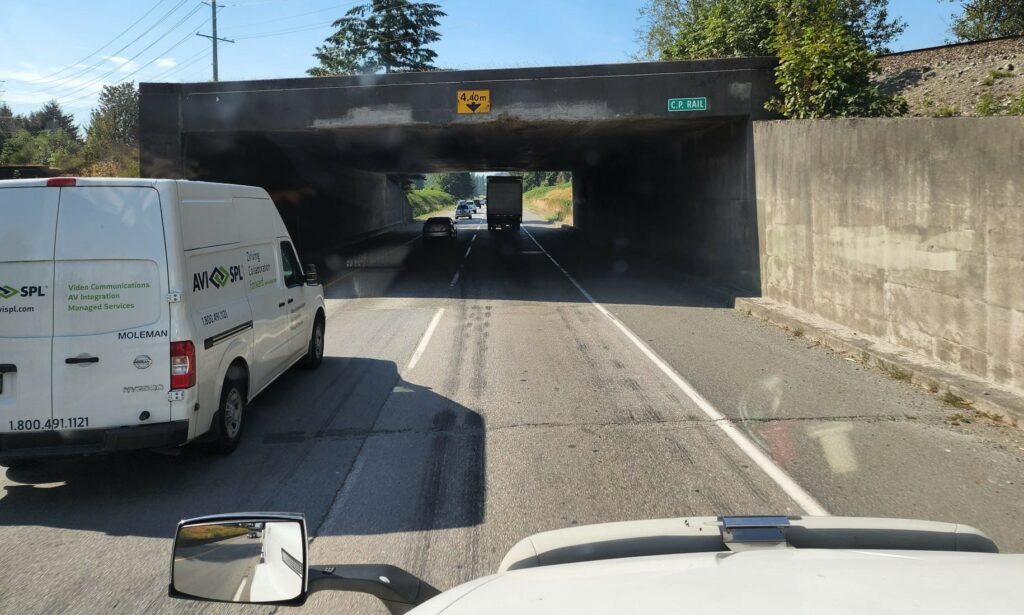Drivers who hit B.C. infrastructure could face $100,000 in fines, 18 months in prison
Drivers of commercial trucks involved in infrastructure crashes in British Columbia will face higher penalties. The proposed changes to the Commercial Transport Act (CTA) will enable the courts to impose fines for as much as $100,000, as well as imprisonment up to 18 months upon conviction for violations, according to a news release.
“With these new penalties, we are taking the strongest action possible to keep our roads safe and to keep people, goods and services moving,” Rob Fleming, minister of transportation and infrastructure said in the release. “This also sends a message to commercial truck drivers that they are responsible for the safe transportation of goods and services on our roads, and a lax attitude toward safety will not be tolerated.”

The legislative changes are in response to 35 crashes that have occurred since late 2021 by over-height commercial vehicles. Laws surrounding highway infrastructure crashes have not changed since the 1970s. The overwhelming majority of responsible truck drivers and the trucking industry have urged tougher action on the small number of irresponsible operators that have caused these crashes.
The proposed maximum penalty for commercial transport violations is far above other Canadian provinces and territories, and falls in line with the maximum penalties applied to rail and dangerous-goods safety.
BCTA welcomes proposed changes
The B.C. Trucking Association (BCTA) has been consulted and supports the proposed increase in maximum penalties. “The BCTA welcomes the legislative change by the Province to hold carriers accountable,” said Dave Earle, BCTA president and CEO. “Imposing stricter penalties for carriers supports road safety and helps protect infrastructure, and ultimately enhances safety for everyone on our roads.”
Last month the B.C. government issued a formal cancellation notice to Chohan Freight Forwarders, the carrier that crashed six times in two years into the province’s infrastructure.
This change represents the latest in a series of steps the ministry has taken recently to address the issue, including formalizing a progressive-enforcement framework and carrier-suspension policy that provides escalating consequences for carriers who commit repeat offences, including the possible loss of safety certificates, prohibiting their operation.
Speed limiters mandated
Fines were recently raised to the highest amount allowed under the current law for over-height vehicles, from $100 to the maximum allowable penalty of $500. A new requirement was also put in place (effective June 1, 2024) for in-cab warning devices to alert dump-style vehicle operators when the dump box is raised. Speed-limiter devices were also mandated, preventing heavy commercial vehicles from travelling more than 105 km/h on B.C. highways.
The province has successfully taken up this issue with federal, provincial and territorial counterparts through the Council of Ministers Responsible for Transportation and Highway Safety. The council is working to address loopholes where carriers with problematic safety records prohibited in one jurisdiction may continue operating in a neighboring jurisdiction.
Have your say
This is a moderated forum. Comments will no longer be published unless they are accompanied by a first and last name and a verifiable email address. (Today's Trucking will not publish or share the email address.) Profane language and content deemed to be libelous, racist, or threatening in nature will not be published under any circumstances.
Personally I would just avoid hauling high loads in BC. I would say most drivers will refuse. Too risky. It would eliminate bankruptcy fines and jail.
The permit system needs to be updated also. I wonder how many carriers wait for days and they go without the permit? Superloads are taking 6 weeks to process. When there is multiple BC districts involved in issuing permits, the time requirements grow. There should be certain routes with maximum dimensions, weights and axles allowed pre-certification for permits. Thus would free up staff for different routes and faster permit issued.
Hauling around a 10 million dollar mobile television studio everything i do is safety conscious to watch these guys rolling down the Coke at 120 kms an hour is absolutely absurd.
Not only are they killing them self but killing innocent people.
This will never change as they will just yell discrimination
We need flashing lights if the truck is too high and all the truck drivers need to pass a basic English test in B C and warning signs in English and French. To bring in foreign or untrained drivers without a better training program by many trucking companies is a big mistake. Just putting truck drivers in jail will not solve the problem. In Ontario is see many foreign students drive that truck or Uber get in a bad crash and just leave Canada